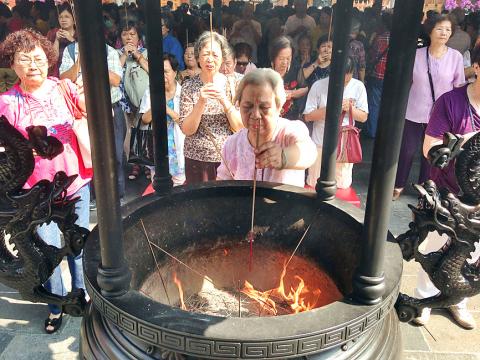Taipei’s Xingtian Temple’s (行天宮) announcement on Sunday that it would prohibit incense and food offerings to become more eco-friendly met with mixed reactions yesterday.
The popular temple, which is dedicated to Guan Gong (關公), a legendary third-century heroic general-turned-deity, is to remove its two incense burners and 12 offering tables beginning today. The temple is asking visitors to put their hands together in prayer instead of burning incense or offering food, stressing that what matters is a sincere heart.
Chang Wei-tung (張偉東), chief executive of the Lugang Matsu Temple (鹿港天后宮) in Changhua County, yesterday said that while he supports practices that aid the environment, he objects to the idea of removing incense burners and offering tables.

Photo: CNA
As the two items are indispensable during Taoist rituals, it would be disrespectful to the deities without them, he added.
Officials of the popular Chaotien Temple (朝天宮) in Yunlin’s Beigang (北港) said that while they approved of the Xingtian Temple’s move, they also need to be considerate toward the feelings of temple-goers, and as such they would wait and see before deciding whether to follow suit — a stance echoed by several temples in Greater Tainan.
Meanwhile, Singang Incense Artistic Culture Garden manager Chen Wen-chung (陳文忠) said that banning incense may project the false image that it has detrimental health effects, which he says is a blow to Taiwanese incense manufactures who have worked to make high-quality incense.
He said that while cheap Chinese-made incense might contain harmful chemicals, most Taiwanese incense products are made from sandalwood or herbs and are harmless to people.
Chiayi County’s Sibei Liousing Temple (溪北六興宮) chief executive Chiang Hsiao-fan (江筱芃) said that although it is a trend among local temples to reduce the use of incense burners, getting rid of them is “too big a culture shock for Taoists.”
She recommended retaining them and leaving the choice of whether to burn incense to worshipers.
Meanwhile, many incense vendors near the busy entrance to the Xingtian Temple expressed concern, saying that it would destroy their livelihoods.
Xingtian Temple deacon Lee Chu-hua (李楚華) said that it is most important that a worshiper be pious, and that without the offerings, no more food will be wasted.
Lee said that, as a tradition, visitors to the temple often offer rice pudding, but since the Consumers’ Foundation found a few years ago that many rice pudding products contained high levels of preservatives, visitors have stopped taking their offerings home after the rituals.
Consequently, the temple throws away about 1,000 rice puddings each day, resulting in a tremendous waste of food, he said.
Lee said that as far back as 2003, temple administrators said that it would start adopting environmental and waste-reduction practices.
“Over the years, the temple has been reminding visitors to embrace environmentally friendly practices on a daily basis. Many vendors have anticipated this day to arrive and have been doing business elsewhere,” Lee said.
Additional Reporting by Chang Tsung-chiu and Yu Pei-ju

Alain Robert, known as the "French Spider-Man," praised Alex Honnold as exceptionally well-prepared after the US climber completed a free solo ascent of Taipei 101 yesterday. Robert said Honnold's ascent of the 508m-tall skyscraper in just more than one-and-a-half hours without using safety ropes or equipment was a remarkable achievement. "This is my life," he said in an interview conducted in French, adding that he liked the feeling of being "on the edge of danger." The 63-year-old Frenchman climbed Taipei 101 using ropes in December 2004, taking about four hours to reach the top. On a one-to-10 scale of difficulty, Robert said Taipei 101

Nipah virus infection is to be officially listed as a category 5 notifiable infectious disease in Taiwan in March, while clinical treatment guidelines are being formulated, the Centers for Disease Control (CDC) said yesterday. With Nipah infections being reported in other countries and considering its relatively high fatality rate, the centers on Jan. 16 announced that it would be listed as a notifiable infectious disease to bolster the nation’s systematic early warning system and increase public awareness, the CDC said. Bangladesh reported four fatal cases last year in separate districts, with three linked to raw date palm sap consumption, CDC Epidemic Intelligence

US climber Alex Honnold left Taiwan this morning a day after completing a free-solo ascent of Taipei 101, a feat that drew cheers from onlookers and gained widespread international attention. Honnold yesterday scaled the 101-story skyscraper without a rope or safety harness. The climb — the highest urban free-solo ascent ever attempted — took just more than 90 minutes and was streamed live on Netflix. It was covered by major international news outlets including CNN, the New York Times, the Guardian and the Wall Street Journal. As Honnold prepared to leave Taiwan today, he attracted a crowd when he and his wife, Sanni,

Taiwanese and US defense groups are collaborating to introduce deployable, semi-autonomous manufacturing systems for drones and components in a boost to the nation’s supply chain resilience. Taiwan’s G-Tech Optroelectronics Corp subsidiary GTOC and the US’ Aerkomm Inc on Friday announced an agreement with fellow US-based Firestorm Lab to adopt the latter’s xCell, a technology featuring 3D printers fitted in 6.1m container units. The systems enable aerial platforms and parts to be produced in high volumes from dispersed nodes capable of rapid redeployment, to minimize the risk of enemy strikes and to meet field requirements, they said. Firestorm chief technology officer Ian Muceus said